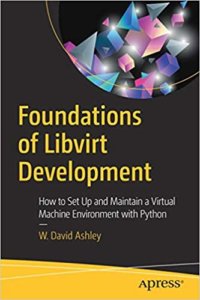Book Description:
Discover the essential concepts of libvirt development and see how to interface to Linux virtualization environments, such as QEMU/KVM, XEN, Virtuozzo, VMWare ESX, LXC, Bhyve, and more. This book will prepare you to set up and maintain a virtual machine environment.
You’ll start by reviewing virtualization in general and then move on to libvirt-specific concepts using Python, including virtualized operating systems and networks, connections, storage pools, and event and error handling. This work concludes with a comprehensive look at the XML schema definitions for domains, networks, devices, network filtering, storage, node devices, and more.
The libvirt API covers the entire life cycle of virtual objects, from creation to destruction. It contains everything needed for the management of a virtual object during that life cycle. While libvirt has APIs that support many languages, Foundations of Libvirt Development concentrates on Python exclusively, and how to use the APIs to control virtual machines under the QEMU/KVM system. and more.
What You’ll Learn
- Interface Python to the libvirt library.
- Review the class layout and methods of the libvirt library.
- Install and manipulate virtual machines via Python/libvirt.
- Create XML to manipulate domains, networks, and devices.
- Write Python programs to perform libvirt functions without human intervention.
Who This Book Is For
Maintainers of virtual machines in a UNIX/Linux environment ranging from managing code on a single virtual machine through an entire installation of virtual machines.
